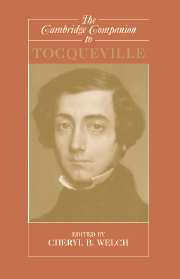Book contents
- Frontmatter
- Introduction: Tocqueville in the Twenty-First Century
- 1 Tocqueville’s Comparative Perspectives
- 2 Tocqueville on 1789: Preconditions, Precipitants, and Triggers
- 3 Tocqueville’s New Political Science
- 4 Tocqueville, Political Philosopher
- 5 Tocqueville’s Democracy in America Reconsidered
- 6 Translating Tocqueville: The Constraints of Classicism
- 7 The Writer Engagé: Tocqueville and Political Rhetoric
- 8 The Shifting Puzzles of Tocqueville’s The Old Regime and the Revolution
- 9 Tocqueville and Civil Society
- 10 Tocqueville on Threats to Liberty in Democracies
- 11 Tocqueville on Democratic Religious Experience
- 12 Tocqueville on Fraternity and Fratricide
- 13 Tocqueville and the French
- 14 Tocqueville and the Americans: Democracy in America as Read in Nineteenth-Century America
- Bibliography
- Index
- Series List
8 - The Shifting Puzzles of Tocqueville’s The Old Regime and the Revolution
Published online by Cambridge University Press: 28 January 2007
- Frontmatter
- Introduction: Tocqueville in the Twenty-First Century
- 1 Tocqueville’s Comparative Perspectives
- 2 Tocqueville on 1789: Preconditions, Precipitants, and Triggers
- 3 Tocqueville’s New Political Science
- 4 Tocqueville, Political Philosopher
- 5 Tocqueville’s Democracy in America Reconsidered
- 6 Translating Tocqueville: The Constraints of Classicism
- 7 The Writer Engagé: Tocqueville and Political Rhetoric
- 8 The Shifting Puzzles of Tocqueville’s The Old Regime and the Revolution
- 9 Tocqueville and Civil Society
- 10 Tocqueville on Threats to Liberty in Democracies
- 11 Tocqueville on Democratic Religious Experience
- 12 Tocqueville on Fraternity and Fratricide
- 13 Tocqueville and the French
- 14 Tocqueville and the Americans: Democracy in America as Read in Nineteenth-Century America
- Bibliography
- Index
- Series List
Summary
Writing his preface to The Old Regime and the Revolution in May and June 1856, Alexis de Tocqueville gave his own view of one of his climactic work's abiding puzzles: ''The book I now publish is not a history of the Revolution . . . ; it's a study of that Revolution.'' In keeping with this express rejection of his work as history per se, Tocqueville made a concurrent decision to omit from his book the entire edifice of supporting scholarly documentation customary to similar historical works by his contemporaries. He excised, we might say, his book's ''scientific'' content in the interest of providing what he viewed as a more succinct, more personal, less intimidating, more accessible genre of political and social commentary. He chose pedagogy over history - a choice that readers and scholars of The Old Regime have worked assiduously to overturn ever since the book's publication almost 150 years ago.
It was Gustave de Beaumont – himself a prize-winning historian and the reviewer, with his wife, of Tocqueville’s final galley-proofs, although not of the outlying texts encompassing his introduction and endnotes – who first sought to build the posthumous case for Tocqueville, the historian. After providing his own view of Tocqueville’s historical method in his 1861 introduction to Tocqueville’s (Euvres, he made the first teasing reference to his friend’s extensive reading notes on the French Revolution: “To publish a single volume [of The Old Regime], he wrote ten,” Beaumont correctly claimed, although he then exaggerated their status as “so many fully developed works.”
- Type
- Chapter
- Information
- The Cambridge Companion to Tocqueville , pp. 188 - 215Publisher: Cambridge University PressPrint publication year: 2006



